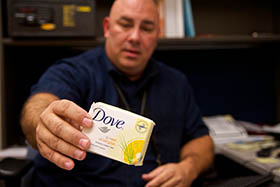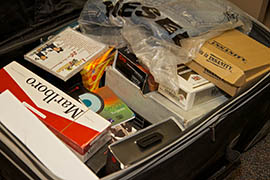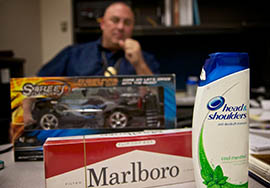Cronkite News has moved to a new home at cronkitenews.azpbs.org. Use this site to search archives from 2011 to May 2015. You can search the new site for current stories.
Special detective unit on lookout for crimes against Phoenix businesses
PHOENIX – Passing through a central Phoenix discount store on his rounds, Detective Sgt. David Lake picks up a bar of Dove soap. Nothing seems out of place until he turns the box over. It features labeling for a foreign market – a red flag.
“Is there any reason that Dove would be marketing a bar of soap in the United States written in Russian?” he said. “No.”
This soap, made in Turkey, was stolen in transit to Russia and moved through a series of underground distribution channels to the United States.
“Why would anybody go to all that trouble?” Lake said. “Money. Thirty million people use drugs. Three hundred million use soap. If I can get this into the marketplace, I can have 10 times the market than I do in the drug world.”
Lake heads the Phoenix Police Department’s Business and Economic Stability (BEST) project, a unit of eight detectives focused on protecting the city’s businesses from crimes including intellectual property theft, trafficking in counterfeit and stolen goods and fraud schemes.
“Whether it’s a fraudulent business or a business that is the victim of fraud, we’re looking at the incredible amount of money that is lost to our communities through crime,” Lake said. “When businesses are damaged, they pull out and you get a barren environment without jobs. That leads to crime, and you get an inner city effect – whole neighborhoods locked into a downward spiral.”
The BEST unit began as a three-month pilot program in spring 2013. During that time, the team of four detectives confiscated $1 million in counterfeit goods, investigated more than $1 million in stolen items and made 40 arrests.
The Phoenix Police Department commissioned a study to determine the economic impact of those illicit activities. A forensic accounting firm concluded the losses amounted to $224,000 in sales tax revenue, $216,000 in wages and nine jobs.
Trafficking in counterfeit and pirated goods is booming worldwide. From handbags to pharmaceuticals to agricultural pesticides, the fake products market was valued $650 billion in 2008 by the International Chamber of Commerce, eclipsing other aspects of the shadow economy such as weapons and human trafficking. By 2015, the ICC estimates, the counterfeit goods trade will top $1.7 trillion.
In his office, Lake showed a reporter a bottle of fake Head and Shoulders shampoo, pirated workout DVDs and knockoff name-brand jeans.
The harm of counterfeit goods extends from loss of taxes to labor exploitation and violence, he said.
“No legitimate people were used to build it, no legitimate businesses were used to move it, no legitimate businesses were used to sell it,” Lake said. “Are they cartel members? Is the person who made this a 10-year-old child being used as slave labor? These are the things we’re worried about.”
In 2008, the ICC estimates, counterfeit goods cost developed countries $125 billion in lost tax revenue and additional social services spending and resulted in the loss of 2.5 million jobs.
“If you’ve lost your job, you’re not a very good customer,” Lake said. “You’re not a very good taxpayer. You’ve dropped out of our economic engine.”
The Internet has given Valley traffickers of fake and stolen goods access to the global marketplace. Last year, Phoenix police broke up a Web operation selling counterfeit coupons, seizing $25 million in fake coupons and $2 million in assets including vehicles, guns and a 40-foot speedboat.
“This is cartel-style money generation from one lady selling coupons,” Lake said. “There’s no drug-trafficking organization in the world that can have that kind of reach – out in the open, on the Internet.”
Another recent case handled by Lake’s unit led to the arrest of a person who was stealing DVDs from Redbox kiosks.
The law enforcement community is taking notice of the BEST team’s approach. The U.S. Department of Justice awarded the unit a $50,000 grant in September to assess the impact that selling stolen goods has on public safety and legitimate business. Lake recently gave a presentation at the INTERPOL intellectual property crime summit in Dublin, Ireland, and was scheduled to speak at Australia’s Centre of Excellence in Policing and Security.
Lake equates the threat from economic crime to a virus attacking a healthy body.
“As the virus gets stronger, we need a stronger response. If it gets too successful, the body gets sick, the immune system gets weak, and it can kill the host,” he said. “Eventually, crime could wipe out your economy.”









